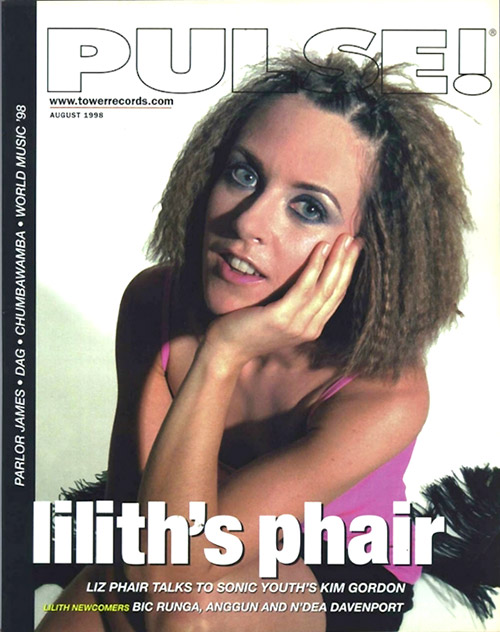Sonic Youth’s Kim Gordon Interviews Liz Phair on the Brink of Lilith Fair
Four years and one baby later, Liz Phair is ready to swan dive back into public life. Phair’s first burst of fame came in 1993 with her sassy, sexually frank debut Exile In Guyville (Matador), which scaled various chants, earned lavish critical attention and eventually landed her on the cover of Rolling Stone. Phair’s meteoric ascent was hindered only by uneven live performances, fueled by debilitating stage fright. Assertively upper-middle-class, white, suburban and — especially — female, she eschewed political correctness while honing in on a carefully crafted bad-girl image. After her less successful ’94 follow-up, Whip-Smart (Matador), Phair took a year break, played a few comeback gigs, then got pregnant and continued her hiatus through the birth of son Nick.

On a sunny Friday afternoon in her hometown of Chicago, Phair is back at home in front of the cameras, posing campily, coquettishly, decked out like a barely updated Cyndi Lauper. Career-wise, she’s poised to take the second plunge with a new record, whitechocolatespaceegg (Matador) and a spot on this year’s X-chromosome dominated Lilith Fair tour, alongside Bonnie Raitt, Des’ree, Natalie Merchant, Sarah McLachlan and other heavy-hitter women of pop and rock. One wonders, though, how a complex lyric like “I never realized I was so dirty and dry / ’til he knocked me down, started draggin’ me around / in the back of his convertible car… and I liked it, I liked it more and more” (from “Johnny Feelgood”) will fit in with the other Lilith fare. In preparation, she’s busy with voice lessons, gearing up to deal with her dislike for performing and, as she puts it, “learning to play live again.”
Kim Gordon wouldn’t have time for stage fright. Early in a five-week Sonic Youth tour (short by SY standards), she’s set to play two full concerts in a single day in Chicago — the dash from afternoon college gig to evening rock hall executed with military precision. The mainstay alt-rocker has a young child of her own with husband and fellow Sonic Youth member Thurston Moore; Coco, now 4, is out with the band supporting their latest outing, the expansive A Thousand Leaves (DGC). Where Phair’s hit-seeking new songs are unrepentantly power poppy, cogitating on loves and losses, Gordon’s postpunk work with Sonic Youth has grown increasingly exploratory, as is clear from the group’s other latest record, Musikaj Perspektivoj, an even more sprawling collaboration with leading experimentalist Jim O’Rourke released on their own SYR label.
After a round of joint photos, a preliminary discussion of the ups and downs of rock motherhood and an in-depth exchange of fashion opinions, Gordon and Phair sit down to swap notes on power and gender and to contrast their respective — very different — musical aspirations.
Liz Phair: Nice suit, Kim!
Kim Gordon: So are you already thinking about what you’re gonna have to wear on stage?
LP: No, I haven’t given it any thought. You want to know what I really want to wear? I want to wear dresses.
KG: Are they wearing dresses on the Lilith Fair?
LP: Probably not.
KG: Go to Agnes B, get a couple of simple dresses.
LP: So, can I ask you a question? What does your new CD sound like? Is there strange, long feedback stuff or is it more short song structure?
KG: It’s exceedingly uncommercial. [laughs] The shortest song is like six minutes.
LP: Did you write them all before, or was there some composing in the studio?
KG: We just wrote them in the studio. We have our own studio, so we turn on the 16-track at a certain point when the songs get structured a certain way and start recording them. That way we don’t have to go to the studio when we’ve already done demos for a song, worrying that the demos sound better.
LP: What about vocals?
KG: That always comes afterward. We sit around and improvise more like jazz musicians or something. There’s one song that we wrote and recorded in one day; the vocals were improvised.
LP: For the first time on this album, I literally appropriated two songs that other people composed the music for; they were all finished, just missing any vocal. I wrote a song to their music, this kind of cool thing I’d never done before. On this album you must have done a lot of that.
KG: I don’t choose what I sing. Thurston usually has a clear idea of what he wants to sing on or what songs are good for him to sing on, and then I’ll sing on whatever weird songs are left! [laughter] Lee [Ranaldo] has the most singerly, melodious voice, though he likes to talk-sing.
LP: Do you make up your own words?
KG: Yeah. Although Thurston made up lyrics to one of the songs — which is funny because it’s the most punky and it’s from a girl’s point-of-view.
LP: Which one?
KG: “Ineffable Me.” He knows I like Pavement, so he said: “I’ll write you some Pavement lyrics.” [Liz takes Kim’s suit jacket, puts it on and walks to a mirror at the other end of the room, styles, then returns.]
LP: That’s nice. I don’t have a husband where we do that kind of creative interplay. That must make for a really interesting marriage.
KG: So what are the songs that you didn’t write the music for?
LP: “White Chocolate Space Egg” and “Baby Got Going.”
KG: What song is going to be the single?
LP: “Johnny Feelgood.”
KG: That’s what I thought. Either that or the one about the bartender [“Polyester Bride”].
LP: They tell me I have one shot, isn’t that creepy? I’ve been out of it for four years, come back and it’s like: “The men of the industry are abuzz with the new way things work.”
KG: MTV told Geffen: “Don’t give them any videos unless they’re superstars. Don’t even bother.”
LP: What do you mean, “superstar”?
KG: Like a Beastie Boys or Beck. Somebody really huge. But we did a video with McCauley Culkin, and he’s a superstar.
LP: That’s smart. I’ll get Keanu Reeves. When you’re told you’re not a superstar, maybe that’s the moment of creative inspiration, like: “Really? Well fuck you.”
KG: I always liked the videos you did. The first one, it reminded me of early Madonna videos, when she really had that pluck, she really wanted to make it. It showed a charisma.
LP: I really like those old videos because they feel like diaries, and I don’t keep a diary. I was at my parents’, we were checking the VCR the other day, and I stuck in the tape and it’s like: “God, I did that. Look at that.” And they are kind of plucky, there’s a little heroine in the story. Madonna’s “Lucky Star.”
KG: Yeah, that’s great. “Borderline”.
LP: You don’t like the new one?
KG: I don’t like it when musicians just appropriate whole styles. And even though she comes out of the club dance thing, it’s like: “Hey, I’ll do this electronica thing now.” It just sounds a little stiff and empty. And the whole marketing of spirituality.
LP: Didn’t you ever feel a new beginning in your life?
KG: Yeah, but I didn’t feel a need to use it as a marketing tool. Partly it’s just the position she’s in, it’s not her fault I really liked the VH-1 special on her going back home and showing where she used to rehearse. She said: “Had I known what I’d have to give up…”
LP: Did she actually say she wouldn’t have done it?
KG: Yeah. She didn’t just imply it, she actually said.
LP: I would never say that. I don’t believe her.
KG: It’s a tough position. I can’t think of anything more difficult than being a solo artist, like yourself. You’re just out there alone. You’re so vulnerable. I’m protected, I’m part of a group.
LP: Now that you mention it, I’ve forgotten what it’s like to be scrutinized. It’s been four years.
KG: I’d forgotten too, and I was really excited, then bad reviews came in. I just would really rather not be made self-conscious about what we do. I’d rather just do it.
LP: I want people, if they don’t like it, to just be like: “Yeah, I don’t like it,” and forget about it and let me go about my life. Because it’s such a private thing to make music and to like it, and nobody’s holding me up for public office, I don’t have to serve the people. I’m making something for people to buy or not buy. People take it so intently, they say: We want this excised from society, you have made something that will ruin my life, how could you be so shallow? Or whatever they’re going to say about me. It’s going to be nasty, really nasty.
KG: But you have really different things you want out of the music. Don’t you want to be a pop star? Sell millions of records?
LP: Yeah, that would be great. That’s an esoteric thought, because I don’t want to lose those reviews that make me wonder who I am and wonder whether I really am focused. Because you can’t help but read, and they’re usually smart people reviewing you…
KG: I don’t know if I would assume that at all.
LP: There are lots of stupid reviewers out there?
KG: When people don’t understand something, they’ll usually just interpret it or write it up anyway. I think there’s a handful of people who relate to or understand what I’m doing vocally. But that’s a different way of working, like painters or artists; you’re surrounded by peers. Obviously, we’re doing it for people, but it’s like that immediate group of people who you want to like it, they’re the ones that matter.
LP: For me, it’s really sappy, but I just want to make people happy, I want to make them feel the way I feel when I listen to music.
KG: What music do you like that you want to listen to over and over again?
LP: Last night I was watching The Box and “Gettin’ Jiggy Wit It” came on. This is how bad I am. But I like really good stuff too, really difficult going. I loved OK Computer. When I listen to [whitechocolatespaceegg], sure sometimes I get bored because I’ve heard it so much, but generally speaking it makes me laugh a little, the lyrics are funny, or it makes me feel good or a little contemplative. I don’t want to…
KG: … be so heady with it?
LP: Yeah.
KG: It definitely reminded me of a girly ’80s record.
LP: Probably right in my teen years.
KG: I was just curious about Fiona Apple?
LP: I listened to all her singles; I never had any of the CDs.
KG: It seems like all these women are really mining women singer/songwriters. Were there any whose voices you especially liked, mainstream or indie rock?
LP: I liked Fiona, I loved Alanis’ first couple of things. I love to hear in the music my own life replayed for me. That whole women-in-rock thing is about women’s experiences, usually involving love interests and being dicked over. I enjoy hearing the subject matter being relatable to my life, from my perspective. It makes my life happier.

KG: Do you like Cat Power?
LP: I don’t know Cat Power. Do you?
KG: I love her voice. I think she’s maybe a little lazy. She’s just so natural at it. I guess she’s such an “I-am-a-singer/songwriter,” I wish she’d just put herself at a little more risk, have more ambition. Focus.
PULSE!: I wonder if you see Lilith Fair as a sort of ghettoization?
KG: I don’t see it as ghettoizing at all, I see it as really broadening. You know, the way that Lollapalooza organized the audience and showed that there was an audience for alternative music. It galvanized forces and showed that there was money power behind it.
PULSE!: Would Sonic Youth play Lilith Fair?
KG: Only my songs! [laughs] I don’t know what you mean by ghettoization.
LP: I know what he means. It’s the same thing they said about African Americans. If you give them affirmative action, then they’re being hired because of their race. You will be known forever as part of a female movement, never be able to break out of it.
PULSE!: Is it a convenient way to provide a forum…
LP: [mock-sneezes] Bullshit! OK, look at all those singles, they’re huge. The [performers] I saw at that press conference — Paula Cole, Sarah McLachlan, Shawn Colvin, Lisa Loeb — they all had singles out that I can sing all the words, just because they’re catchy, not because I really want to analyze them deeply. Just like any male pop star can do. I looked around me and there was radio, VH-l; that’s not ghettoizing, that’s pop stars. That’s demonstrating the viability of a female marketplace. Two years ago they said: “Women don’t buy records.” All I kept hearing was 15- to 24-year-old males are the only people who buy records, and that determines how many videos you make, your photo shoots.
KG: I think there’s a certain sound that’s been equated with women in music right now, which is very much a part of who’s been playing on Lilith Fair. That’s mainstream, to me. That’s what Lilith is about, more than it being ghettoizing as a gender thing. I would be worried about being ghettoized as far as style. I would rather go see a woman who I saw the other night whose instrument was a rock. That’s my preference. I thought it was incredibly sexy. It’s an issue that never goes away. Like that Rolling Stone women-in-rock thing. I thought it was very interesting that Jan [Wenner, publisher] chose women to sell the biggest issue of his magazine. Using women as sex objects in a passive way. Because women sell magazines, put scantily clad women on the cover.
PULSE!: The potential downside is illustrated there, that it becomes part of an industry’s marketing.
LP: But that’s not pop, that’s about life.
PULSE!: But we’re talking about it specifically in terms of the music industry.
LP: I’m much more concerned with how long we’ll live under “aggressive male/passive female” everywhere, all the time, in our relationships, in our relationships with our parents, in our workplace.
KG: I think however you try to deconstruct that passive image, it seems to end up as some device. It’s hard to escape that. Women are saying: “We’re doing it ourselves, we have more power. Whatever. Do it ’cause you want to do it.
PULSE!: The image of a powerful woman as an image can sell magazines, too.
KG: Yeah, exactly.
LP: That Buffy the Vampire Slayer thing [April 2 Rolling Stone cover], I couldn’t decide what to make of it. She was in this dominatrix outfit, looked amazingly hot, looked very comfortable, but I was on the fence about it. Is it catering to men?
KG: There are very few women doing anything with irony in terms of their looks, except you are.
LP: I try to. I wrote songs as a man on this album, and I can’t think of anybody who’s done that before. I was really proud of that.
KG: I did.
LP: You did?
KG: It’s called “Female Mechanic Now On Duty.”
LP: Isn’t that cool, though?
KG: But music aside, we started out talking about clothes and image is a really serious issue. It’s part of your armor. You at least are trying to deal with irony, and I applaud that. Debbie Harry used to do that, and nobody’s really done that since then.
LP: I like doing it, it comes naturally to me. But I get a lot of other questions about how the way I look makes other girls feel and stuff.
PULSE!: It confuses people.
LP: And that’s good. I think one of the dangerous things about the women-in-rock thing is that it’ll be forgettable in a while. It’ll be forgotten. Remember that whole ’60s thing, how it faded off into “Well, now we know what happens when you do a lot of drugs,” instead of what they thought at that time, that optimism that things were really changing. Settling back into same-old same-old. But it’s not really the same-old.
By Jon Corbeit
Pulse!, August 1998






